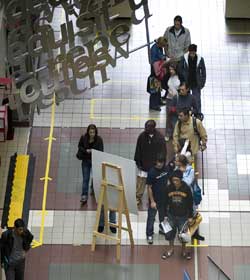Most students say Concordia their first choice

New students wait for their ID cards in the Library building atrium.
photo by andrew dobrowolskyj
As bookstore and shuttle bus lineups extend exponentially, it’s evident that we’re back to school. But what brings students to Concordia?
The university’s Institutional Planning Office has initiated a series of surveys to collect data that will answer that and many other questions.
Brad Tucker, as Director of Institutional Planning, translates that raw data into information that will which will help us build on our strengths and identify areas that need attention.
Results from a preliminary sample of 3,800 students completed last spring revealed that 71 per cent had picked Concordia as their first choice. “This may be surprising to some,” Tucker said.
Although most of the data from the reputational survey the university commissioned has yet to be coded, Tucker looked at preliminary trends as evidenced by 500 of the respondents’ responses when asked why they came to Concordia. “This is where the fun starts for me. I love the analysis.”
The coding process is arduous, especially when those surveyed were not asked to choose from a handful of responses, but instead answered an open-ended question. Tucker has to sort those answers into coherent patterns.
For instance, 29 per cent of the sub-sample Tucker looked at mentioned a particular program of study. Another 9.2 per cent said that it was a faculty or school that caught their attention. It would appear that nearly 40 per cent of students were attracted by a particular area of study offered at Concordia.
“The literature suggests that students select universities based on their interests; their choice of program will reflect that,” Tucker said.
A number of students in this initial sample also pointed to location, location, location as a deciding factor. But the results are less clear than at first glance.
Just over eight per cent of the sample chose Concordia because they were attracted to Montreal as a city. Another 8.4 per cent were also interested in Montreal, but because of convenience, either because they already lived here, or knew people who did.
Finally, 6.8 per cent picked Concordia because it is an English university in a bilingual city. For some, that meant continuing to study in their own language; for others, they were attracted by the opportunity to improve their English.
An entirely anecdotal survey of new students waiting for their ID cards reinforces these results. Several students had registered because of a particular department. Journalism and Political Science were mentioned more than once, with the John Molson School of Business and Engin-eering also popular.
Similar reports came from discussions with a handful of new students in the International Students Office. Many said they found Concordia on the Internet when looking for particular programs.
Some came to Montreal because it was bilingual. That was why Jeanne Dorelli came from France to study film at the Université de Montréal three years ago. But the city itself changed her.
“I decided to learn English and realized I wanted to study political science. I picked Concordia over McGill because of its image.”
Tucker said that the initial responses he has sifted through bear that out as well. Various students were attracted to Concordia because of its reputation, because it’s “not like McGill” and because more liberal acceptance deadlines make us “more approachable.”
Of course, you also can’t beat word of mouth. Rick Toure came from the states to study at the JMSB just like his brother, who graduated two years ago. “Plus, the campus is right downtown,” he added.